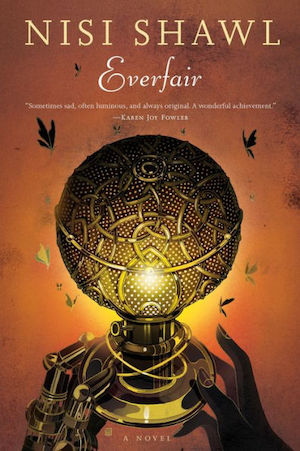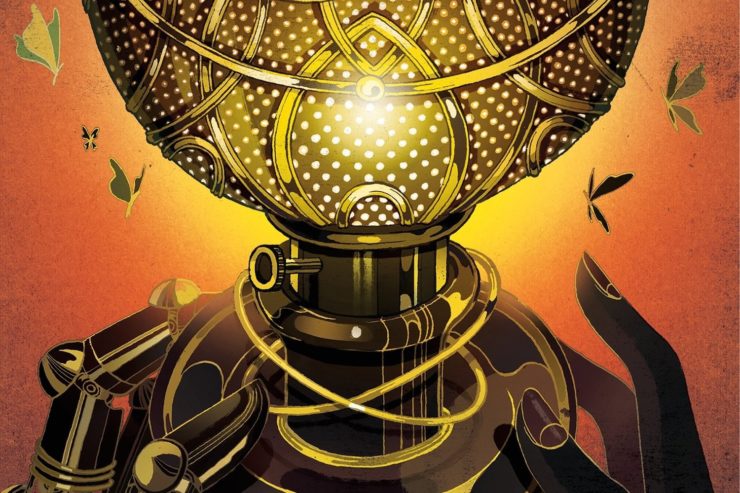This essay is a sequel to Charlie Jane Ander’s essay, “Never Say You Can’t Survive: When Is It Okay To Write About Someone Else’s Culture or Experience?” (published October 6, 2020)
And Gladly Wolde I Lerne
I teach an average of 70 writing classes a year—overseas, online, in local library meeting rooms. Most of these classes cover ways of representing characters with significant demographic differences from the author, their editor, the intended audience, historical perceptions of the subject, and so on. I study this sort of thing, and I love sharing what I find out, and I love to keep on learning as I teach. The question-and-answer sessions ending classes are marvelously informative.
One lesson I’ve gotten from repeatedly hearing student questions is that authors who care about inclusive representation in fiction are often deeply concerned about messing it up. We think we can do too little in pursuit of “Writing the Other.” We think we can do too much. We think we can hurt people by unknowingly perpetuating racial stereotypes, religious stereotypes, and all the rest of the tedious clichés unimaginative authors avail themselves of. All of this is true, and all of these dangers are avoidable with work.
The hardest work, though, and the work I cringe to see students mishandling, is the work of figuring out whether or not to try, and how, and why, and what will happen if you do or don’t tell a story that’s not centered on your own demographic.
What Matters More
Here’s what’s wrong with the way some people ask me about this problem: they frame their queries as if the thing that really matters is the damage to themselves. “What if my novel manuscript is rejected unread by agents and publishers because it’s not authentic enough?” one woman asked me. “What if Twitter overflows with snark about my story’s innocent mistakes?”
Breaking news: you are not the center of any universe. Not the actual universe. Not the literary universe. None universes is the total sum of which you are the center.
This can be comforting, if you allow it to relieve the performance pressure some of us feel. As a writer, you can relax in the realization that you don’t have to tell all the stories. And that’s particularly helpful if you’re hesitating to undertake a particular story because you’re not part of the culture or community you would depict in it. Someone else may be better equipped to tell the story you’re hesitating over—in fact, they may have already told it. Which doesn’t mean you have no right to tell it too. It just means you’re not alone in the enterprise.
Catching hell for what you write is part of being a writer. Being taken to task for our errors, innocent or otherwise, is how we find out what they are, find out how to fix them, how to avoid them in the first place. We should all expect the difficult-to-accept outcome of sometimes being called on our ish. There are procedures you can adopt in these situations—go quiet on social media for a day, thank those who’ve taken the time to tell you what you messed up, change what it’s possible to change, declare your intention to do better in the future.
The main thing to remember is that this work is not about you. Stereotype-reinforcing fictional depictions of spicy Chicana housekeepers dancing the mambo with their eight kids—or whatever ridicule-prone images you’ve created in your readers’ minds—can lead to real-life pain and suffering. Being excoriated for committing that kind of error can feel awful, too, and can even have short-term effects on your career. But that’s not why it’s bad.
Truth or Consequences
It’s bad because that poorly thought-out representation could lead a doctor seeing a clinically depressed Latinx woman to deem her complaints trivial or manufactured, and so to withhold necessary medication. It could lead voters to reject a ballot initiative supporting childcare provisions, thereby increasing poverty and malnutrition. It could lead employers to rationalize away the need to raise housekeepers’ pay, using what you’ve written to posit their employees’ current happiness in the absence of such a raise.
Stereotypes flatten human complexities into readily manipulable caricatures. Caricatures are easy to write. The humans they map onto are easy to ignore when encountered outside of literature—and also easy to kill. You don’t want to be responsible for anything like that, do you?
In the WisCon Guest of Honor speech Charlie Jane referred to in her post published earlier this October, Hiromi Goto gave her audience a list of questions to ask and answer as preparation for writing from the viewpoint of someone outside their demographic category. These are hard questions. What you decide based on the results of your self-interrogation may mean you abandon your project, as Charlie Jane abandoned hers.
Not Setting the Drawer on Fire
Or you may elect to try other strategies, such as:
Lying — I don’t recommend this, but there are authors who’ve given it a whirl, as in the case of JT LeRoy (cited here by Charlie Jane), or that of Michael Derrick Hudson.
Collaboration — You can try to enlist the creative participation of someone more closely aligned with the traits of the community you’re depicting. If you do that, be prepared to listen their input. What they tell you may not appear to you to have any bearing on what you want to accomplish. Or it may not make the kind of sense you’re used to hearing. That’s good; that’s helpful. That’s what you need.
Reframing — Perhaps you’re better off telling a tale of indigenous resistance from the perspective of a captured invader rather than a native-born guerilla leader. Look again and again at the story you want to tell, and make up your mind whether it must inevitably be narrated by someone of a demographic group other than your own. Or maybe you’d like to explore multiple axes of difference by assigning each their own character and their own narrative voice (a strategy I used in my novel Everfair).
Sensitivity reads — You’re going to want these anyway, even when you’re not including the Other as your story’s central figure. But by choosing to represent a protagonist whose background and life experiences are different than your own, you’re upping your readers’ exposure to them geometrically. You’re increasing your chances of writing something offensive or harmful by a huge factor, and you should increase the feedback you receive by the same factor. Find multiple readers, and engage them at multiple points in your writing. And I can’t emphasize this too often: listen to them.
Whatever you decide, remember that this part of the creative process is about how your work affects the world. Not about how the world rewards or punishes you for doing it.
On A High Note
But let’s say you, like Charlie Jane, come to the conclusion you just can’t write the story you’d first envisioned writing. Let’s say thorough self-examination forces you to realize that said story isn’t yours to tell. There are still many things you can do to nurture the growth and success of that story. K. Tempest Bradford and I teach ways to accomplish this as a segment of our Writing the Other courses. We talk about the concept of being a “Social Justice Bard.”
Buy the Book


Everfair
Here’s a version of what we recommend that’s relevant to this sort of predicament: Find authors belonging to the same community whose members you wanted to model your characters on, and support their work by reading it, recommending it to others, and nominating it for awards. Find #ownvoices stories in the vein you wanted to work in and donate copies of them to libraries, schools, prisons, senior centers, and so on. Bring these stories to the attention of reviewers, teachers, and scholars. In essays and interviews, point to them as examples of what you’d like to see published. If you have any editing cred, create anthologies centered on the topics you wanted to explore. Then ask #ownvoices editors for help putting the anthologies together and solicit contributions to them from #ownvoices authors.
In It Together To Win It Together
You’re not the center of the universe. And that’s good. Why? Because you’re out here with the rest of us. You aren’t required to do everything yourself, all alone. You belong to a growing group of writers who want to improve the representation of historically marginalized people, a group which in fact includes some of those historically marginalized people. As a member of this group you have a wealth of expertise to draw on; you have centuries and centuries of accumulated experience to turn to. So you say you want what you write to make an impact? You want to make sure you and your reputation as a fantabulous author attract acclaim? You say you identify with our multiplex world, and you want to make speculative fiction more representative of that world, more diverse?
Let’s go. Don’t worry too much about getting yourself hurt in the process. Let’s take care of each other. We can do it.
Nisi Shawl is a writer of science fiction and fantasy short stories and a journalist. They are the author of Everfair (Tor Books) and co-author (with Cynthia Ward) of Writing the Other: Bridging Cultural Differences for Successful Fiction, and the editor of the multiple-award-winning anthology New Suns: Original Speculative Fiction by People of Color. Their short stories have appeared in Asimov’s SF Magazine, Strange Horizons, and numerous other magazines and anthologies.











I love this essay so much. So many lines in here that I’m going to be quoting forever. Like, “You are not the center of the universe… this can be comforting.” “Stereotypes flatten human complexities into readily manipulable caricatures.” “We’re all in this together.”
This piece has given me a lot to think about, in an extremely good way, and I’m going to keep coming back to it. I love the reminder that it’s not about any individual author, it’s about community. Thank you Nisi for writing this piece, and thanks to Tor.com for running it.
“…donate copies of them to libraries…”
Are you aware that this is not actually possible for most large public libraries in North America? They have their acquisition policies, and it’s just not possible to simply make a private donation. It is however, often pretty easy to talk them into buying a copy themselves! [and there’s probably a way to make monetary donations to the library if you really want to be a benefactor]
Good point about the large public library procedure details. I’ve donated books directly to smaller libraries, such as the one in the Senior Community Center in my neighborhood–but when people think of libraries they’re usually thinking of city or county systems, or those that are part of a school. Thank you for the clarification!